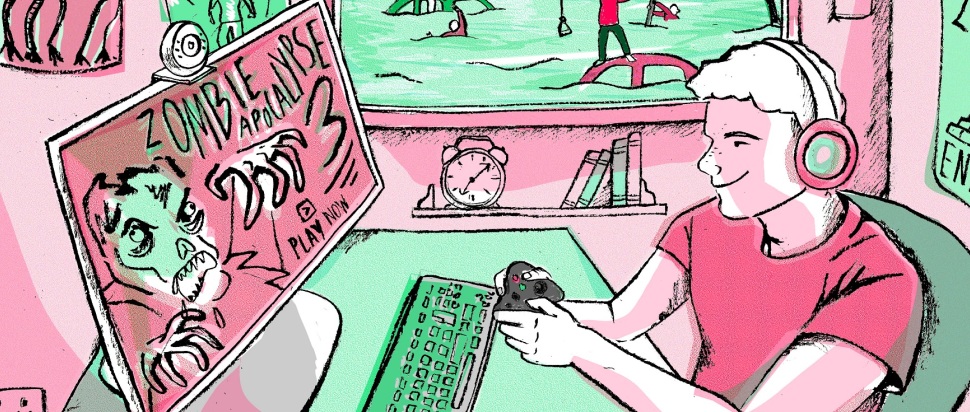Apocalypse Now: Why we can’t get enough of the end of the world
Mainstream culture loves a good apocalypse story, but what exactly does our fascination with the end of days say about us?
The only recurring dream that I can remember having as a kid is this. I’m walking on a never-ending pavement covered in cracks. If I step on a crevasse then, oops, I cause a nuclear bomb to go off and it’s the end of the world. I would wake up in sweats, thinking I was responsible for humanity’s survival and the cause of its annihilation.
Since then, I’ve become obsessed with the end of the world, or rather, fantasies about the end of the world. What’ll get us first: nuclear fallout or mass starvation, a poisonous sea or outer space asteroid?
And I don’t think it’s just me. As a culture, the end of the world has proven to be an endless source of fascination. From misinterpreted ancient myths (shoutout 2012) to a string of disaster movies where The Rock or Gerard Butler is our last hope at preventing a climate catastrophe (God help us), different apocalyptic visions have become a source of both entertainment or terror, most often at the same time.
Historically, a collective enthralment about the end of the world has developed with and from political and social turmoil. In the Victorian era, advances in technology inspired an influx of apocalyptic sci-fi. Jump forward to the 20th century and World War I and II, the Cold War and 9/11 are responsible for each consecutive generation’s paranoid pop culture.
Our fascination with the end of days might seem like fear of a far away future, a kind of cultural dramatisation for when the Doomsday Clock finally strikes midnight, but most societies and cultures have already experienced something apocalyptic. Humans have been through a lot: war, famine, extinction, genocide, epidemics. Entire cultures have been decimated, with colonialism being humanity’s most recent alien invasion narrative. Imagine this: an unknown race turns up on your shore, intent on committing horrific acts of violence with the firepower to do so. In fact, it was the British invasion of Tasmania in the 1800s and the catastrophic impact colonialism had on the island’s indigenious population that inspired H.G. Wells to write the most famous invasion novel, The War of the Worlds.
So, why are we all obsessed with the end of days? It seems irrational that humans, a species neurologically incapable of even thinking about their own deaths, would devote so much time and energy to thinking up different ways we can be wiped out.
In her 1965 essay, The Imagination of Disaster, Susan Sontag famously wrote about the influx of disaster movies that were appearing in cinemas. She propositioned that they were a response to the trauma of living through the 20th century. Movies like Invasion of the Body Snatchers and Godzilla were cathartic fantasies, in which “one can participate in the fantasy of living through one’s own death and more, the death of cities, the destruction of humanity itself.” Through witnessing the end of days – safely in cosy cinema seats – we’re able to project ourselves into these apocalyptic possibilities.
Nearly 60 years on, Sontag’s words are still resonant. Whether it’s aliens, zombies or climate disasters, we’re still obsessed with disaster. The most popular mass entertainment at the moment – superhero movies – all feature threats to Earth and the annihilation of metropolitans. The government and the army aren’t the ones who save us in those movies; instead it’s a couple of powerful and gifted individuals in capes who take matters into their own hands. These recent on-screen fantasies perfectly epitomise our contemporary stance on the end of the world: lulled into a false sense of security, the end of the world might be coming but someone will turn up at the last minute to save us. We’re allowed to switch off and become apathetic to the threat of actual annihilation, most likely the side effects of climate change.
In my opinion, the best apocalyptic stories are the ones that take place after the end of the world. The Handmaid’s Tale, The Walking Dead in its early days, and The Leftovers are all popular explorations of life after the apocalypse. These stories go beyond cathartic extinction and ask how we maintain our humanity after everything collapses in on itself – for better or worse.
As Sontag wrote, we want to imagine “living through” our collective death. We want to be the ones who survive, the protagonist who somehow makes it through the end of days. Everything ends except you. It makes sense that we love a survivor; every single person on Earth is the descendent of people who made it through everything that’s already happened.
It turns out the end of the world isn’t coming. Whether in the form of war or famine, the end has already happened and this is what we’re left with, our post-apocalyptic world. Everything around us is a desperate attempt to hold on to what we had before as we’re left to gather around the campfire, telling our stories of survival and asking, was all this worth it?
